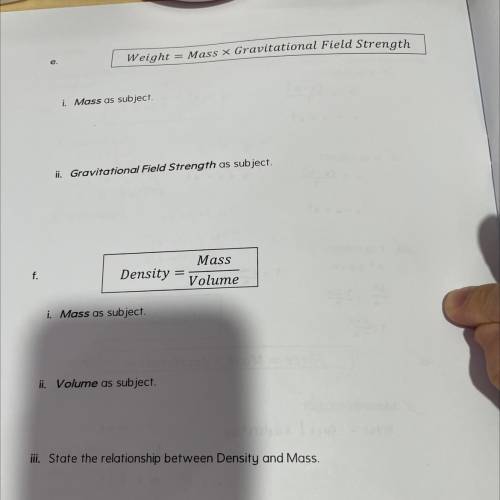E. weight = mass x gravitational field strength
i. mass as subject
ii. gravitarional field s...

Physics, 24.08.2021 05:30 lilybear1700
E. weight = mass x gravitational field strength
i. mass as subject
ii. gravitarional field strenght as subject
f. density=mass/volume
i. mass as subject
ii. volume as subject
iii. state the relationship between density and mass
iv. state the relationship between densith anf volune


Answers: 2


Other questions on the subject: Physics

Physics, 21.06.2019 22:50, periwinkleaqua72
An electron and a proton have the same kinetic energy upon entering a region of constant magnetic field and their velocity vectors are perpendicular to the magnetic field. suppose the magnetic field is strong enough to allow the particles to circle in the field. note: you'll need to look up the masses for an electron and proton. 1) what is the ratio of the radii of their circular paths rp/re?
Answers: 3


Physics, 22.06.2019 03:00, nkidder
An electric current is flowing through the cord below. what will happen to this current if a magnet is brought near the cord? a. the electric current will stop flowing. b. it will exert a force on the voltage. c. the resistance of the wire will decrease. d. it will exert a force on the electric current.
Answers: 2

Physics, 22.06.2019 08:30, katiemh8302
A17,250 kg rocket is pushed with a thrust of 6,450,284 n. what is the acceleration of the rocket?
Answers: 1
You know the right answer?
Questions in other subjects:





Mathematics, 30.03.2021 20:20


History, 30.03.2021 20:20



Mathematics, 30.03.2021 20:20



